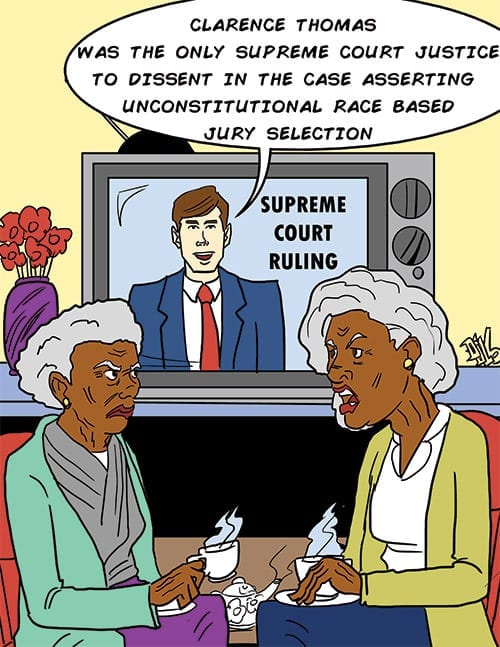
Prior to the Civil Rights Act of 1964 there were few opportunities for blacks to achieve recognition for outstanding performance in America. Most occasions involved sports, music or entertainment. In fact, such opportunities were so rare that many people were often concerned about the price paid for success. During the slavery days, slave rebellions often were defeated because a fellow slave had found it in his best interest to divulge the plans to the plantation owner. The recent vote of Justice Clarence Thomas of the U.S. Supreme Court in the case of Foster v. Chatman indicates that such concerns still exist for African Americans.
Years ago when blacks were relegated to subservient status in America, the mass media indicated overtly or subtly that this position was appropriate. Segregation and discrimination were presumed to be deserved primarily because of innate black inferiority. The psychological impact has been so powerful that many blacks have unfortunately come to believe the racial propaganda.
In past decades blacks have reveled in the success of black athletes. An athletic contest had winners or losers. There was limited opportunity for a successful athlete to be an agent for white interests. When Jesse Owens won four gold medals in the 1936 Berlin Olympics, the achievement was his performance on the field. When Joe Louis entered the boxing ring and vanquished his opponent, the result was obvious. And when Jackie Robinson became the first black major league baseball star, the quality of his hitting, fielding and base running was indisputable.
Achievement in the professions is not quite so transparent. A sound reputation is established over a period of time. Rarely will one event be sufficient, as is often the case in athletic contests. For example, the late Thurgood Marshall, the first black to be appointed to the U.S. Supreme Court, is still highly respected. An alumnus of Howard University, he spent his whole professional career in employing the law to achieve racial equality. He won the Brown v. Board of Education case in 1954 that began the legal unraveling of racial discrimination in America.
Blacks and others still believe that Marshall stood for freedom, justice and equality. However, many blacks believe that Clarence Thomas is more like the quisling in the slave quarters whose function was to preserve the authority of white privilege. Since there can be a legitimate difference of opinion on issues in our complex society, some people have been willing to give Thomas the benefit of the doubt. However, his position in the Foster case makes it much easier to classify him as the tool of white supremacy.
Timothy Foster, an African American, has been sitting on death row since 1987. He was convicted in Georgia of killing a white woman when he was 18. The prosecutor created an all-white jury by eliminating black prospective jurors in defiance of the rules established by the Supreme Court in the case of Batson v. Kentucky. The court had ruled that it was unconstitutional to discriminate in jury selection on the basis of race.
Lawyers for Foster uncovered prosecutors’ documents that clearly established race was the criterion for dismissing potential jurors. Reasons given were found to be simply non-racial subterfuges for the real intent. A 7-1 decision found in favor of Foster. Only Thomas dissented.
There is a downhome country expression: “All black ain’t coal.” With many well educated and talented blacks now emerging, African Americans must be rigorously insightful about those entitled to the support of the community.






